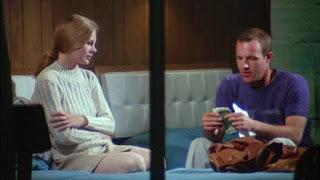 Despite mainstream success, Francis Ford Coppola has always been an experimental director at heart. His fourth feature, The Rain People (1969), is a loosely-plotted road movie, infused with an art house sensibility.
Despite mainstream success, Francis Ford Coppola has always been an experimental director at heart. His fourth feature, The Rain People (1969), is a loosely-plotted road movie, infused with an art house sensibility. Natalie (Shirley Knight) flees her husband after discovering she's pregnant. On a multistate road trip, she encounters Killer (James Caan), a brain-damaged football player drifting aimlessly across America. The two befriend each other, but Natalie second-guesses her decision, pondering a return to her husband. Things grow more complicated still when she meets Gordon (Robert Duvall), a motorcycle cop with less-than-pure intentions.
Critics peg The Rain People as a feminist work, and it's certainly ahead of its time depicting an emancipated woman. Natalie's deeply flawed, fleeing responsibility yet endearingly confused. She can't connect with her husband, who vacillates between threats and pleadings; she dreads rather than anticipates pregnancy. She's drawn to Killer as a hunky simpleton without agency, but grows disgusted after discovering even this man-child has baggage. But the macho, misogynist Gordon's no answer either. In her journey, Natalie finds no solace in men or herself; it's a bitter road to self-actualization.
Beyond its heroine, The Rain People stumbles. Coppola's ragged narrative recalls a distaff Easy Rider, yet never generates momentum: the aimlessness becomes a drag rather than a virtue. Killer's bizarrely sexualized as both child and boy-toy; Gordon's a grandstanding, horny jerk. They're more symbols than men, a counterculture Lenny and George. The film jerks unevenly between episodes, some good (Natalie and Killer's hotel stay), others misjudged (a long petting zoo interlude), before wrapping in an overly-neat finale.
Coppola's direction is self-consciously artsy, indulging an Antonionian fondness for long takes, lingering shots of awkward phone calls, ponderous close-ups of rain-swept glass, violent flashes of football action recalling This Sporting Life. One effective scene contrasts Gordon badmouthing his dead wife with a flashback to her grim fate. Rain People works best when downplaying these gimmicks for straightforward storytelling, with Coppola most effective in simple, intimate moments.
Shirley Knight anchors the movie, seeming wounded, aimless and endearingly confused. James Caan proves adept playing an innocent, damaged bruiser, while Robert Duvall's coarse eccentricity fits his role well. Coppola cast both men in The Godfather, assuring their super-stardom.
It's hard to classify The Rain People: an uneven experiment, an elliptical character study, a great director's formative work. Coppola's next "art film," The Conversation, is much more assured, his flourishes serving the story.

